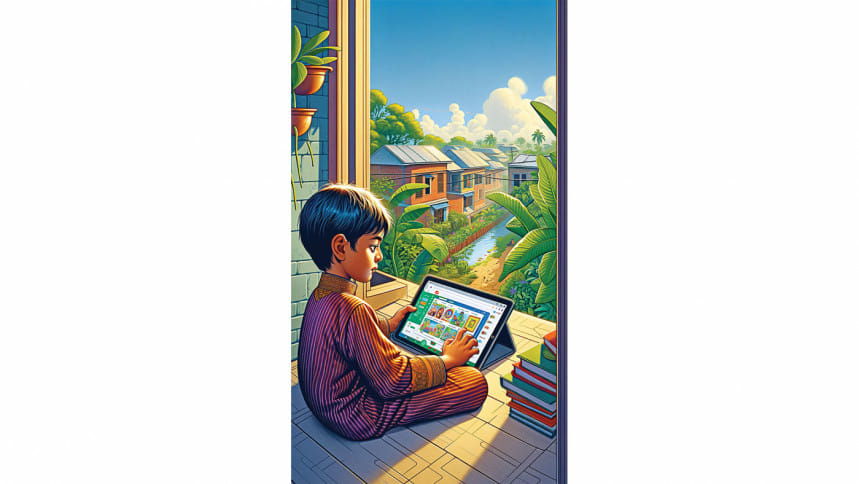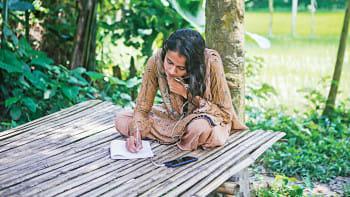Digital learning as a catalyst for educational equity and economic growth in Bangladesh

As Bangladesh grapples with the challenges of educational inequality, digital learning emerges as a transformative force. This paradigm shift is not merely a response to modernity but a strategic necessity to bridge the educational divide between rural and urban areas. The introduction of digital learning platforms is progressively providing fair and equal access to education for all, irrespective of geographical and socio-economic barriers. This is crucial in a country where around 51% of the population still battles with illiteracy, with child labour, early marriage, and high population growth being significant contributing factors.
Since achieving independence in 1971, Bangladesh has embarked on a journey of profound transformation. Marked by resilience and a relentless pursuit of progress, the country has seen significant strides in various sectors, notably in education. However, while literacy rates have improved over the decades, challenges persist in ensuring quality education for all, particularly in bridging the rural-urban divide. Addressing this gap is not just an educational concern; it is central to creating an equitable society.
Post-independence, Bangladesh faced immense challenges, including poverty, political instability, and limited resources. Despite these hurdles, the country has shown remarkable growth. One of the critical areas of development has been in education.
Post-independence, Bangladesh faced immense challenges, including poverty, political instability, and limited resources. Despite these hurdles, the country has shown remarkable growth. One of the critical areas of development has been in education. From a modest beginning, Bangladesh has made commendable progress in increasing its literacy rate. This achievement reflects the nation's commitment to education as a cornerstone for development.
Initially, the focus was on increasing enrolment and reducing gender disparities in education, resulting in significant strides in literacy rates. According to recent data, the literacy rate in Bangladesh is now around 78%.
In rural areas, where traditional educational avenues are often obstructed, digital learning offers a lifeline. It's more than accessibility; it's about delivering quality education that was previously unreachable. This shift is vital considering the recent figures indicating that without significant changes, achieving basic literacy in Bangladesh could take an additional 44 years, and an advanced level might take up to 78 years. Digital education provides an accelerated path to reduce these timelines significantly.

Within the last decade, internet penetration in Bangladesh has increased a hundredfold, indicating a significant shift towards a digital economy. This growth underscores the importance of digital literacy and tech-savvy human resources in driving economic development. Digital education is crucial in cultivating these skills among the youth, who are the future architects of Bangladesh's economy.
The JAAGO Foundation, since its inception in 2007, has been at the forefront of this educational revolution in Bangladesh. Its Digital School Program connects rural classrooms to qualified teachers in Dhaka using video conferencing technology, catering to children from pre-primary to class 10.
This program not only provides education but also supports children's nutrition and mental health. This initiative, which aligns with the National Curriculum & Textbook Board's English version curriculum, has democratised access to quality education for 30,000 children in the most remote regions.
In places like Moheshkhali, an island grappling with educational challenges due to its remote location, our Distance Learning Program has made significant strides. By collaborating with the International Office of Migration (IOM) and the Government of Bangladesh, JAAGO has brought English language education to over 9,000 children through digital means, complemented by the training of local teachers in computer skills and IT maintenance.
However, the path to digital education is fraught with challenges. Issues like inconsistent internet connectivity, power outages, and lack of digital devices are significant obstacles. The Covid-19 pandemic has exacerbated these issues, making it clear that student learning, especially among adolescents, was at risk with traditional methods. A World Bank study showed that around 55% of Grade 9 students in Bangladesh do not have access to TVs, a primary remote learning resource during school closures.
The pandemic has propelled the infrastructure for online education in Bangladesh. When schools closed in March 2020, the World Bank helped the government redirect its education projects to avoid irreversible loss of learning. This included stipends and tuition fees for 2.5 million secondary students and a revamp of the country's remote-learning strategy to make it more inclusive and accessible.
Bangladesh's journey towards becoming a developed country by 2041 hinges significantly on education. In the last 13 years, internet penetration in the country has increased 100 times, indicating a shift towards a digital economy. The Digital Bangladesh vision of 2021 focused on improving service delivery using ICTs and developing a knowledge economy. The anticipated changes in the global and national landscape by 2041 emphasise the need for a skilled and educated workforce, capable of adapting to new technologies and innovations.

Today's students are the core of tomorrow's workforce that will build Bangladesh's next great economy. Digital learning is not just about imparting knowledge; it's about preparing students for jobs that may not yet exist, requiring skills that are continually evolving. The personalised, flexible, and innovative nature of digital learning equips students with the necessary competencies to thrive in a rapidly changing world.
As we navigate through the complexities of digital learning, the experiences and successes of initiatives like those of JAAGO Foundation light the path forward. It's a collective call to action, an invitation to join hands in shaping a nation where every child has the right and the means to learn, grow, and thrive in the digital age.
Digital learning is transforming the educational landscape of Bangladesh, making it more inclusive and equitable. This transformation is crucial for the nation's socio-economic development, preparing a skilled workforce ready to contribute to the global economy. As Bangladesh moves towards its vision for 2041, digital education will play a pivotal role in shaping a future where every citizen, irrespective of background, has the opportunity to learn, grow, and contribute to the nation's progress.
Korvi Rakshand is the founder of JAAGO Foundation, a non-profit organisation that empowers underprivileged individuals and communities in Bangladesh through education, youth development, women's empowerment, climate change, governance and poverty alleviation.


 For all latest news, follow The Daily Star's Google News channel.
For all latest news, follow The Daily Star's Google News channel. 







Comments